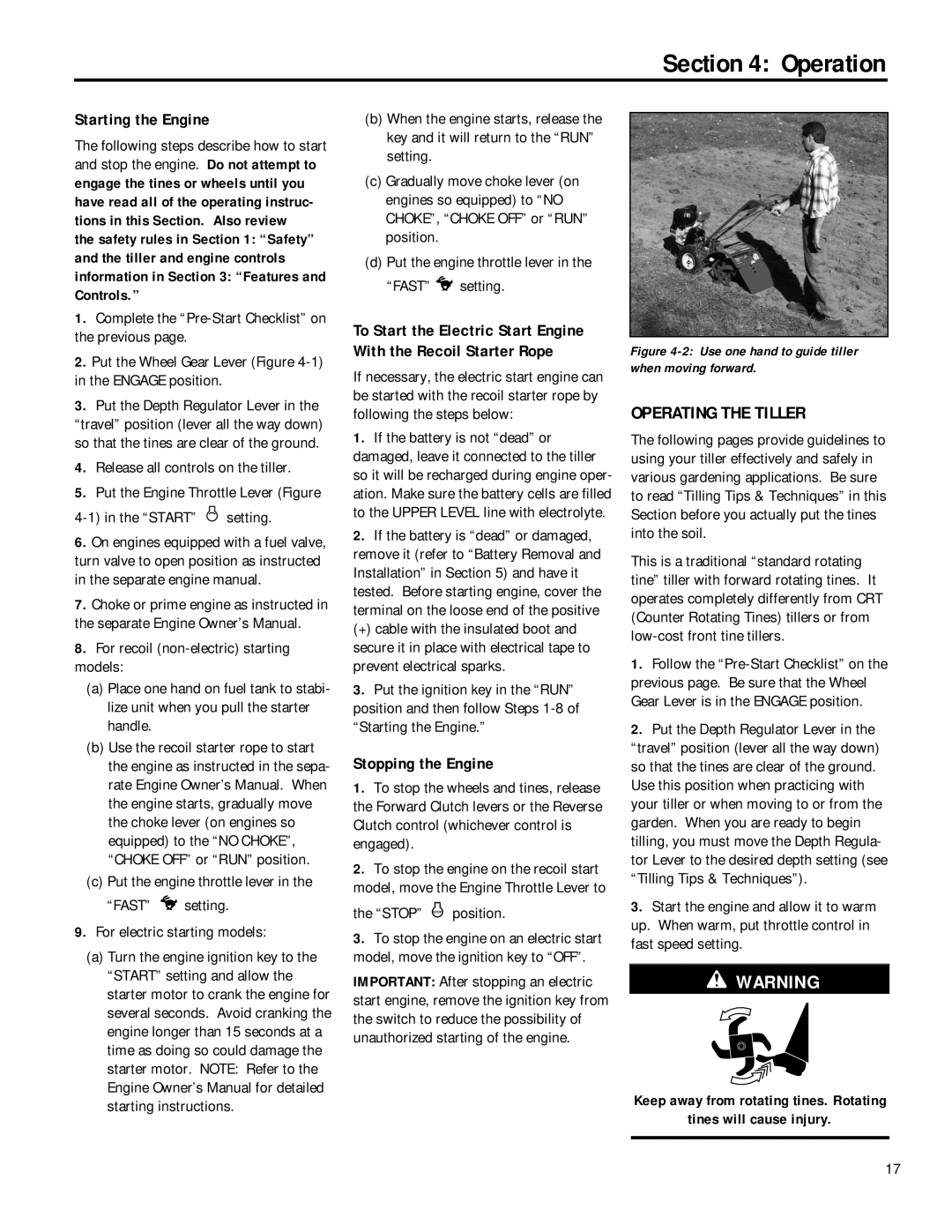
Section 4: Operation
Starting the Engine
The following steps describe how to start and stop the engine. Do not attempt to engage the tines or wheels until you have read all of the operating instruc- tions in this Section. Also review
the safety rules in Section 1: “Safety” and the tiller and engine controls information in Section 3: “Features and Controls.”
1.Complete the
2.Put the Wheel Gear Lever (Figure
3.Put the Depth Regulator Lever in the “travel” position (lever all the way down) so that the tines are clear of the ground.
4.Release all controls on the tiller.
5.Put the Engine Throttle Lever (Figure
![]() setting.
setting.
6.On engines equipped with a fuel valve, turn valve to open position as instructed in the separate engine manual.
7.Choke or prime engine as instructed in the separate Engine Owner’s Manual.
8.For recoil
(a)Place one hand on fuel tank to stabi- lize unit when you pull the starter handle.
(b)Use the recoil starter rope to start the engine as instructed in the sepa- rate Engine Owner’s Manual. When the engine starts, gradually move the choke lever (on engines so equipped) to the “NO CHOKE”, “CHOKE OFF” or “RUN” position.
(c)Put the engine throttle lever in the
“FAST” ![]() setting.
setting.
9.For electric starting models:
(a)Turn the engine ignition key to the “START” setting and allow the starter motor to crank the engine for several seconds. Avoid cranking the engine longer than 15 seconds at a time as doing so could damage the starter motor. NOTE: Refer to the Engine Owner’s Manual for detailed starting instructions.
(b)When the engine starts, release the key and it will return to the “RUN” setting.
(c)Gradually move choke lever (on engines so equipped) to “NO CHOKE”, “CHOKE OFF” or “RUN” position.
(d)Put the engine throttle lever in the
“FAST” ![]() setting.
setting.
To Start the Electric Start Engine With the Recoil Starter Rope
If necessary, the electric start engine can be started with the recoil starter rope by following the steps below:
1.If the battery is not “dead” or damaged, leave it connected to the tiller so it will be recharged during engine oper- ation. Make sure the battery cells are filled to the UPPER LEVEL line with electrolyte.
2.If the battery is “dead” or damaged, remove it (refer to “Battery Removal and Installation” in Section 5) and have it tested. Before starting engine, cover the terminal on the loose end of the positive
(+) cable with the insulated boot and secure it in place with electrical tape to prevent electrical sparks.
3.Put the ignition key in the “RUN” position and then follow Steps
Stopping the Engine
1.To stop the wheels and tines, release the Forward Clutch levers or the Reverse Clutch control (whichever control is engaged).
2.To stop the engine on the recoil start model, move the Engine Throttle Lever to
the “STOP” STOP position.
3.To stop the engine on an electric start model, move the ignition key to “OFF”.
IMPORTANT: After stopping an electric start engine, remove the ignition key from the switch to reduce the possibility of unauthorized starting of the engine.
Figure 4-2: Use one hand to guide tiller when moving forward.
OPERATING THE TILLER
The following pages provide guidelines to using your tiller effectively and safely in various gardening applications. Be sure to read “Tilling Tips & Techniques” in this Section before you actually put the tines into the soil.
This is a traditional “standard rotating tine” tiller with forward rotating tines. It operates completely differently from CRT (Counter Rotating Tines) tillers or from
1.Follow the
2.Put the Depth Regulator Lever in the
“travel” position (lever all the way down) so that the tines are clear of the ground. Use this position when practicing with your tiller or when moving to or from the garden. When you are ready to begin tilling, you must move the Depth Regula- tor Lever to the desired depth setting (see “Tilling Tips & Techniques”).
3.Start the engine and allow it to warm up. When warm, put throttle control in fast speed setting.
WARNING
Keep away from rotating tines. Rotating
tines will cause injury.
17
